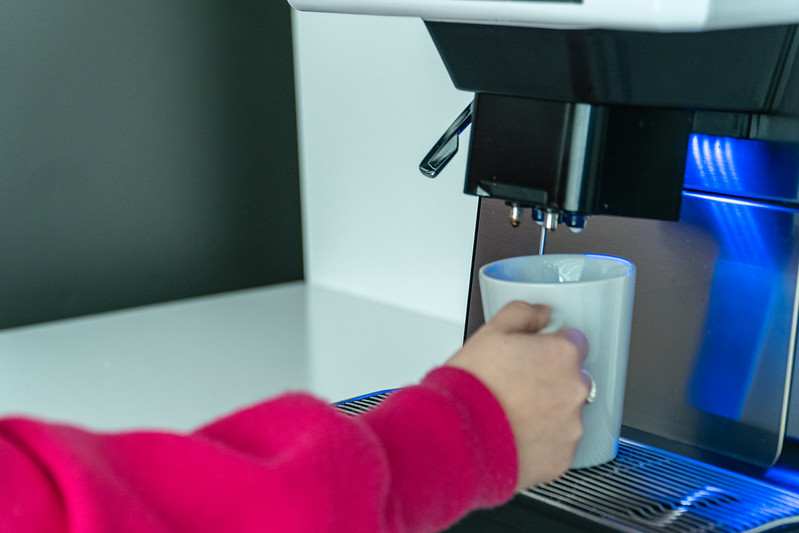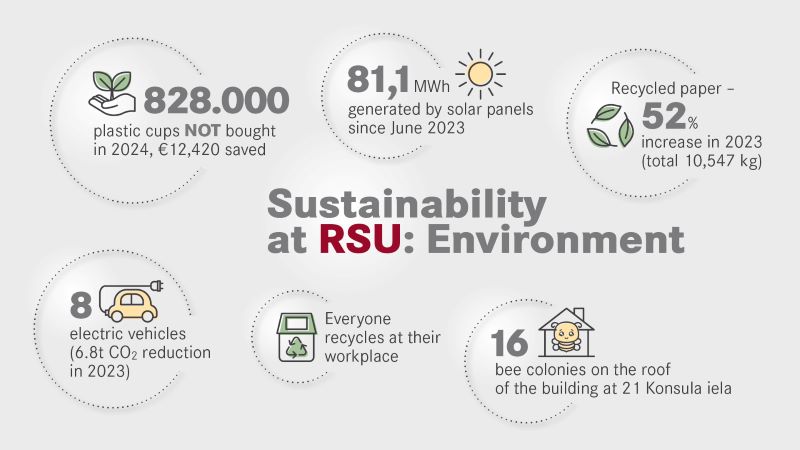Sustainability at RSU: how RSU minimises and sorts waste
Written by: Linda Rozenbaha, RSU Public Relations Unit
We continue our series of articles on sustainability at Rīga Stradiņš University (RSU). This time, we are looking at how we implement and enforce tactics to ensure that less waste is generated and appropriately sorted.

I have arranged an interview with Laila Skrodele, Head of the Building Management and Maintenance Unit of the RSU Department of Infrastructre. It is no coincidence that she has chosen the Pharmaceutical Education and Research Centre as our meeting place where the sustainability-minded environment of RSU is very evident. There are no disposable dishes in the lounge, you can make coffee a reusable mug that you can then put in the dishwasher. In this building, as in others, there is no waste bin under each employee's desk – waste is sorted from the start, all employees have to do, is go to the appropriate container on the floor.
It all started with a water filter
The earliest ‘green ideas’ at RSU, according to Skrodele, started around 2012, when the Rector's Office first tried to use a water filter. ‘Until then, we had invested a lot of human resources to have Venden water bottles available all the time. We installed the first water filter in the Rector’s Office as a test for a year. It was well appreciated, and another fifteen filters were bought,’ recalls Skrodele. People can use water from the filters for free.
When and what we started with
- Until 2012 – replaceable water bottles and disposable cups
- 2012 – the first device connected to the water pipes in test mode
- 2013 – 15 devices connected to the water pipes
- 2024 – 69 devices connected to the water pipes at 17 different RSU locations
Filters save all kinds of resources. Similarly, encouraging people to bring their own reusable dishes or to use a reusable mug available on site eliminates single-use plastic cups. ‘In this way, we save money by not buying countless dishes as well as take care of the environment by not generating waste.’
It is easier not to generate waste in the first place than to sort it later.
Similarly, we save resources through waste management. We don't have waste bins under individual desks, so the cleaner doesn't have to crawl underneath to retrieve them. This saves time. People get up and take what they don't need to the appropriate container. In addition, the containers have bags that can be cut off from the bottom, so you don't have to throw out, say, the whole bag for one apple core,' says Skrodele giving examples of how small eco-friendly changes add up to create savings.
Going above and beyond
Additionally, Skrodele emphasises that since RSU is a leader in many fields, including sustainability, we are doing more than the state requires of us. RSU pays attention to information about green innovations. ‘The outside world is very impressed with what we are doing. For example,
we sort waste more widely than the law requires.
For example, we sort paper separately and give it to the Līgatne Paper factory. Let me remind you that you do not have to pay for the sorted waste - you only have to pay for household waste.
We save by sorting waste!
- We recycle waste – to the Līgatne Paper factory
- 2022 – 6,950 kg
- 2023 – 10,547 kg (an increase of 52%)
- Many of the things we throw out, we could have not bought, but rather reused, while others can be recycled into raw materials.
It is however true that if the sorted waste contains unsuitable items, one must pay a fine. ‘Even if we have sorted our waste carefully, there have been situations when people in the neighbourhood have thrown unsuitable things into our containers located outside. We also don't know the exact time that waste is collected in order to only bring bins out at certain times. Unfortunately, we have to pay fines regularly. We keep a very close eye on our people and educate them about sorting, but we cannot control every situation,’ explains Skrodele. Perhaps a separate place for the containers would solve this situation.
First, people need to get accustomed and be educated
Of course, people might be resistant when new sustainability solutions are initially introduced; they are not used to not having disposable cups or sorting waste.
'It can be difficult for someone at first - until you get into the habit of doing something in a certain way,' agrees Skrodele.
Informational and educational emails are sent to new students at the beginning of the year, and meetings have also been held with students to help them get into the habit and adopt a green lifestyle. I must say that international students especially expect the University to have sustainable solutions. Young people care about the future of the planet.
The best solution is to not generate waste
- We have not bought 828,000 plastic cups in a year
- Financial benefit 12,420 EUR
- RSU provides 69 free water coolers
The next idea that Skrodele would like to see better implemented is for the café to use rentable containers for takeaways. These would be rinsed after use and returned to the canteen, where they are washed thoroughly. ‘So far, people prefer to use disposable boxes for their takeaway food, which are then thrown away,’ she has observed. She praises those RSU departments that have been the most active in supporting sustainable ideas from the very first day – the Finance, Human Resources and Infrastructure Departments.
To sum up the efforts RSU has made to be more sustainable, Skrodele says:
'We are leaders, we do things differently, we move forward and set an example. We don’t stand still!'

Related news
 Olympic Day morning at RSU: exercise, smiles and almost 100 active participantsFor Students, Consolidation, RSU LSPA
Olympic Day morning at RSU: exercise, smiles and almost 100 active participantsFor Students, Consolidation, RSU LSPA


